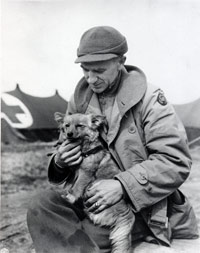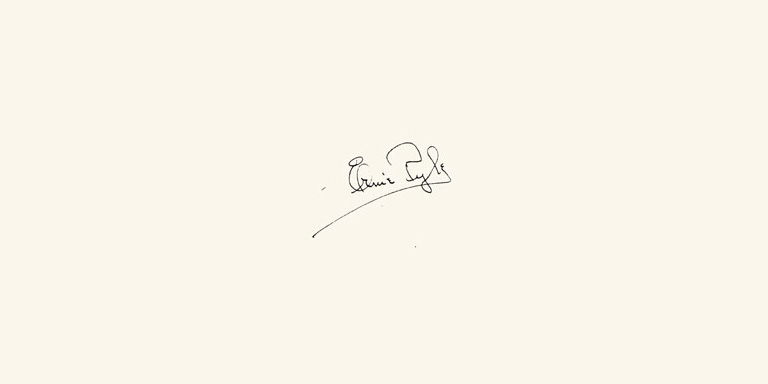Pyle wrote this column nearly a year before the United States entered World War II. It describes the awe he felt as he watched the German air attacks on London.
LONDON, December 30, 1940 – Someday when peace has returned to this odd world I want to come to London again and stand on a certain balcony on a moonlit night and look down upon the peaceful silver curve of the Thames with its dark bridges.
And standing there, I want to tell somebody who has never seen it how London looked on a certain night in the holiday season of the year 1940.
For on that night this old, old city – even though I must bite my tongue in shame for saying it – was the most beautiful sight I have ever seen.
It was a night when London was ringed and stabbed with fire.
They came just after dark, and somehow I could sense from the quick, bitter firing of the guns that there was to be no monkey business this night.
Shortly after the sirens wailed I could hear the Germans grinding overhead. In my room, with its black curtains drawn across the windows, you could feel the shake from the guns. You could hear the boom, crump, crump, crump, of heavy bombs at their work of tearing buildings apart. They were not too far away.
Half an hour after the firing started I gathered a couple of friends and went to a high, darkened balcony that gave us a view of one-third of the entire circle of London.
As we stepped out onto the balcony a vast inner excitement came over all of us – an excitement that had neither fear nor horror in it, because it was too full of awe.
You have all seen big fires, but I doubt if you have ever seen the whole horizon of a city lined with great fires – scores of them, perhaps hundreds.
The closest fires were near enough for us to hear the crackling flames and the yells of firemen. Little fires grew into big ones even as we watched. Big ones died down under the firemen’s valor only to break out again later.
About every two minutes a new wave of planes would be over. The motors seemed to grind rather than roar, and to have an angry pulsation like a bee buzzing in blind fury.
The bombs did not make a constant overwhelming din as in those terrible days of last September. They were intermittent – sometimes a few seconds apart, sometimes a minute or more.
Their sound was sharp, when nearby, and soft and muffled, far away.
Into the dark, shadowed spaces below us, as we watched, whole batches of incendiary bombs fell. We saw two dozen go off in two seconds. They flashed terrifically, then quickly simmered down to pinpoints of dazzling white, burning ferociously.
These white pinpoints would go out one by one as the unseen heroes of the moment smothered them with sand. But also, as we watched, other pinpoints would burn on and pretty soon a yellow flame would leap up from the white center. They had done their work – another building was on fire.
The greatest of all the fires was directly in front of us. Flames seemed to whip hundreds of feet into the air. Pinkish-white smoke ballooned upward in a great cloud, and out of this cloud there gradually took shape – so faintly at first that we weren’t sure we saw correctly – the gigantic dome and spires of St. Paul’s Cathedral.
St. Paul’s was surrounded by fire, but it came through. It stood there in its enormous proportions – growing slowly clearer and clearer, the way objects take shape at dawn. It was like a picture of some miraculous figure that appears before peace-hungry soldiers on a battlefield.The streets below us were semi-illuminated from the glow.
Immediately above the fires the sky was red and angry, and overhead, making a ceiling in the vast heavens, there was a cloud of smoke all in pink. Up in that pink shrouding there were tiny, brilliant specks of flashing light – anti-aircraft shells bursting. After the flash you could hear the sound.
Up there, too, the barrage balloons were standing out as clearly as if it were daytime, but now they were pink instead of silver. And now and then through a hole in that pink shroud there twinkled incongruously a permanent, genuine star – the old-fashioned kind that has always been there.
Below us the Thames grew lighter, and all around below were the shadows – the dark shadows of buildings and bridges that formed the base of this dreadful masterpiece.
Later on I borrowed a tin hat and went out among the fires. That was exciting too, but the thing I shall always remember above all the other things in my life is the monstrous loveliness of that one single view of London on a holiday night – London stabbed with great fires, shaken by explosions, its dark regions along the Thames sparkling with the pinpoints of white-hot bombs, all of it roofed over with a ceiling of pink that held bursting shells, balloons, flares and the grind of vicious engines. And in yourself the excitement and anticipation and wonder in your soul that this could be happening at all.
These things all went together to make the most hateful, most beautiful single scene I have ever known.



